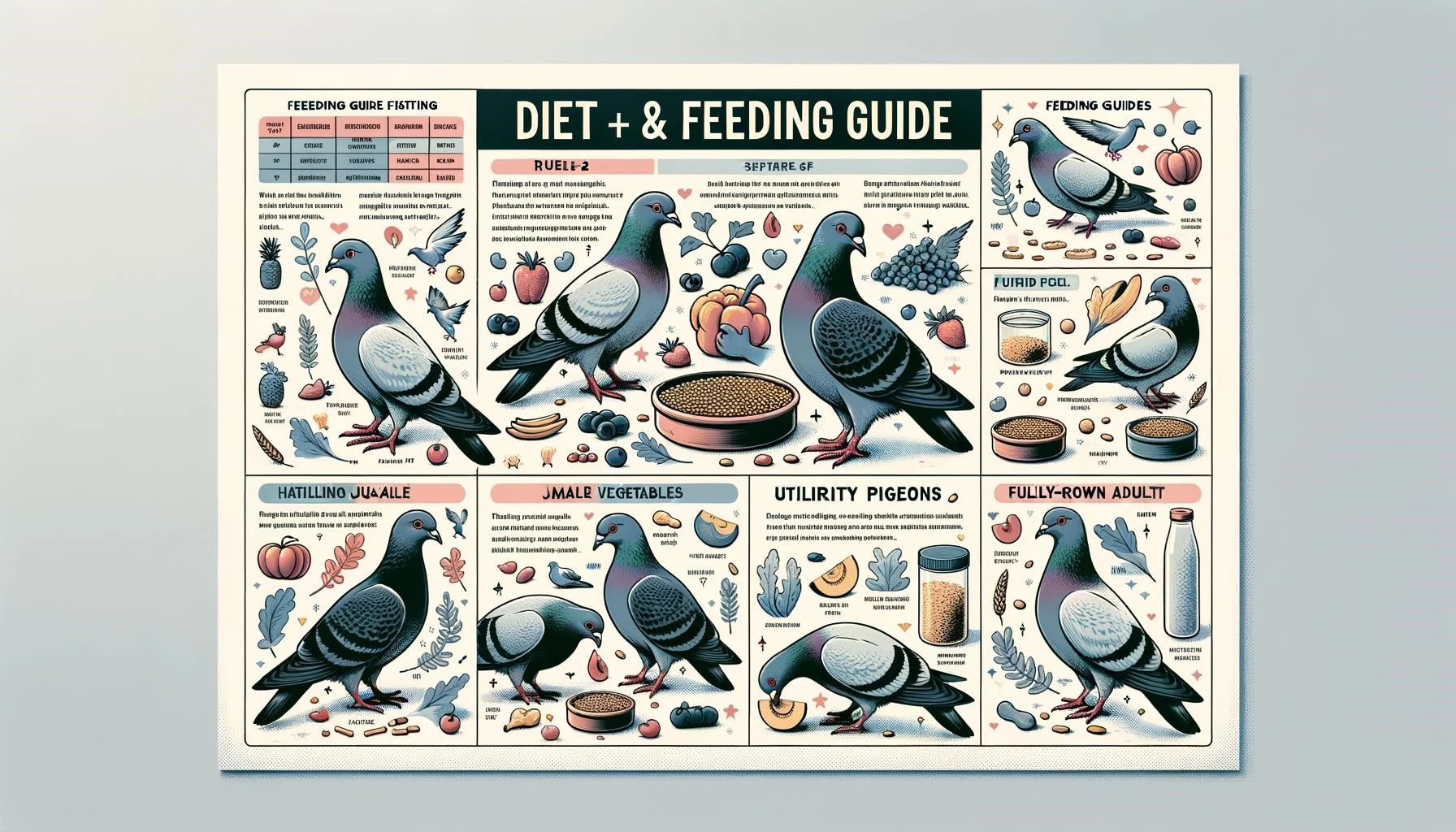Understanding the nutritional needs of utility pigeons is crucial for their health, productivity, and longevity. These specially bred birds require a balanced diet of grains, seeds, fruits, vegetables, and proteins, with their specific needs varying based on their purpose. Ensuring they have access to fresh water and maintaining a clean living environment further supports their overall vitality. Let’s explore the dietary considerations and health practices that can help utility pigeons thrive in their roles, whether it’s meat production or racing.
Key Takeaways
- Utility pigeons have different dietary needs depending on their purpose, such as meat production or racing.
- An ideal pigeon diet consists of fruits, grains, seeds, vegetables, and insects.
- Common foods included in a pigeon’s diet are wheat, corn, peas, millet, oats, berries, nuts, and vegetables.
- Pigeons also require access to fresh water for hydration and digestion.
Diet of Utility Pigeons
Utility pigeons, bred specifically for meat production, have different dietary needs compared to other types of pigeons such as fancy or racing pigeons. The overall diet of utility pigeons will depend on their specific duty, such as meat production or racing.
A balanced diet for utility pigeons generally consists of various types of grains and seeds like wheat, corn, peas, millet, oats, and more. These grains provide carbohydrates, dietary fiber, and proteins, which are essential for the birds’ energy levels, overall health, and digestion. The proportion of grains and seeds in the diet may vary depending on their purpose.
In addition to grains and seeds, utility pigeons can also benefit from incorporating other foods into their diet. Fresh fruits, such as berries, can provide essential vitamins and minerals. Vegetables, including leafy greens, can offer additional nutrients and fiber. These additions ensure a well-rounded diet for the pigeons, supporting their overall health and immune system.
Additionally, protein sources are important in a utility pigeon’s diet. While grains and seeds provide some protein, it’s beneficial to incorporate other protein-rich foods. Insects and worms are a natural part of a pigeon’s diet, providing them with essential protein, vitamins, and minerals. Including insects, such as mealworms or crickets, in the pigeons’ diet can help meet their protein requirements.
It’s important to note that the specific dietary needs of utility pigeons may vary, so it’s recommended to consult with a veterinarian or expert in pigeon care to ensure their nutritional requirements are met.
Along with a proper diet, utility pigeons require access to fresh water at all times. Clean and fresh water is crucial for their hydration and digestion. Pigeons are skilled foragers and may also search for mineral-rich sources of water to supplement their diet.
Feeding Utility Pigeons
Feeding utility pigeons can be accomplished by providing a balanced diet that includes a variety of grains, seeds, fruits, vegetables, and protein sources.
Commercial pigeon food is available that provides a mixture of grains like corn, peas, safflower, oats, milo, and more. This serves as a convenient option for meeting their nutritional needs. However, it’s essential to supplement their diet with fresh fruits, vegetables, and protein sources to ensure a well-rounded diet.
When offering fruits and vegetables to utility pigeons, options such as grapes, apples, and berries are recommended. These can be provided in small quantities or mixed into their diet to provide added nutrients and variety.
Pigeons may also enjoy foraging for insects, snails, and worms in their environment. If the pigeons have access to a natural outdoor environment, it can contribute to their overall diet and provide additional protein and nutrients.
Health Considerations for Utility Pigeons
In addition to a balanced diet, ensuring the overall health and well-being of utility pigeons is crucial for their productivity and longevity.
Regular monitoring of the pigeons’ energy levels, physical condition, and overall health is important. Any changes in behavior, appetite, or physical appearance should be addressed promptly to ensure the pigeons’ health is maintained.
Proper hygiene practices, including providing clean and fresh water daily, can help prevent dehydration and potential health issues. Regular cleaning and maintenance of their living environment, such as their coop or loft, can also contribute to their overall health and prevent the spread of diseases.
Consulting with a veterinarian or pigeon expert can provide tailored advice on the specific nutritional and health needs of utility pigeons. They can help create a feeding plan that ensures the pigeons receive optimal nutrition and can address any specific concerns or issues that may arise.
By providing a balanced diet, proper care, and regular monitoring, utility pigeons can thrive and fulfill their purpose as a valuable source of meat production.








